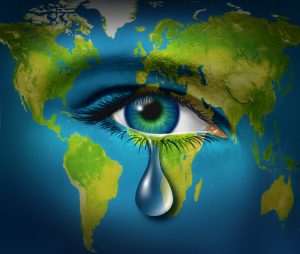Ecological Grief is a type of social grief. It can be more personal but is can also be shared. The term was first introduced by Aldo Leopold in the 1940s to describe the emotional pain tied to environmental losses. Glen Albrecht would later refer to it as a mental distress caused by environmental change. When individuals lose or perceive an anticipatory loss of something, either in a unique personal way or even a more distant way, a grief and distress can result.

The environment affects everyone. Whether the indigenous person directly affected, or the person who lives thousands miles away. A climate that changes for the worst will eventually affect everyone. The ripples of the effect do not forever remain isolated but affect the planet as a whole. This fear and anticipation the type of grief most experience, while unfortunately others are already feeling the direct effects of this type of loss through drought, flooding and extreme weather causing massive displacement.
Social scientists, Ashlee Cunsolo and Neville Ellis both wrote regarding the direct experience of climate change. Cunsolo dealt with the loss of identity of the northern tribes who live on the ice and find identity with the ice. With the polar icecaps melting at an alarming rate, their identity and way of life is being stolen from them. Meanwhile in Australia, Ellis pointed out how farmers for generations are no longer able to grow crops to extreme drought. They too are losing their identity. Indigenous people are losing their identity but also far worst things, including their homes, way of life but also their lives. Flooding and extreme weather are causing massive displacements. These types of grief of total loss create untold sorrow and trauma.
Those more distant from the fire itself are also starting to see small signs of altered weather, but also are in a state of anticipatory grief and fear. Like those who feared nuclear destruction, the new fear is global warming and its pending doom. Individuals fear for the future, their children’s future and what earth will be like by the end of the century.
In addition, many individuals are seeing the loss of climates and habitats. This universal loss to humanity is a great loss. Many grieve the bleaching of the Great Barrier Reef. Scientists witness first hand the loss of beautiful eco systems and divers see the horrible damage to the reefs due to global warming. The loss of beauty itself is a form of loss. As more beautiful habitats die and more animals go extinct, a piece of beauty dies not only for the current generation but also for future generations.
In dealing with ecological grief, individuals must know they are not alone. They must share their frustrations, discuss it and find like minded individuals. Lament the pain together and not only lament but focus on change. First, focus on what one can control. Work towards better ecological friendly life styles when applicable. Recycle, save energy, and try to reduce your carbon footprint. One can also take action at higher levels by becoming more active in political movements to save the planet. Finally, find the natural spaces that do exist, or create some of your own via gardening and partake in the beauty of nature.

Unfortunately, there are many powers who value the dollar over the environment. These individuals push a false narrative against global warming. In addition, there are many individuals who are in denial of the pending problem. They choose to deny the problem and pretend it does not exist. Unfortunately, many powerful people in government as well as news outlet suffer from denial in their grieving process.
One cannot become caught up in denial and lies, but accept the reality that our planet is in need of serious help. Our grief for the situation can be a powerful catalyst to action. Like all social grief, it can lead to social action and change. By taking control of our grief and by playing our small part, we can grieve together but also change together.
If you would like to learn more about AIHCP’s Grief Counseling Certification then please review and see if it meets your academic and professional goals. The program is online and independent study and open to qualified professional seeking a four year certification in grief counseling.
Sources
“Eco Grief: How to cope with the emotional impacts of climate change” by Aviva Fialkow
“Mourning the Land” by Lea Winerman
